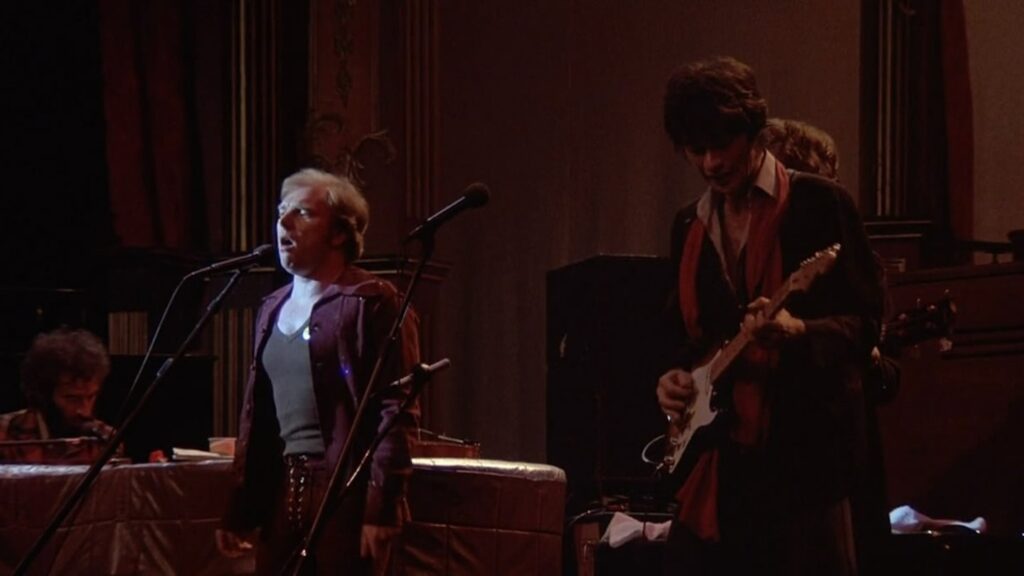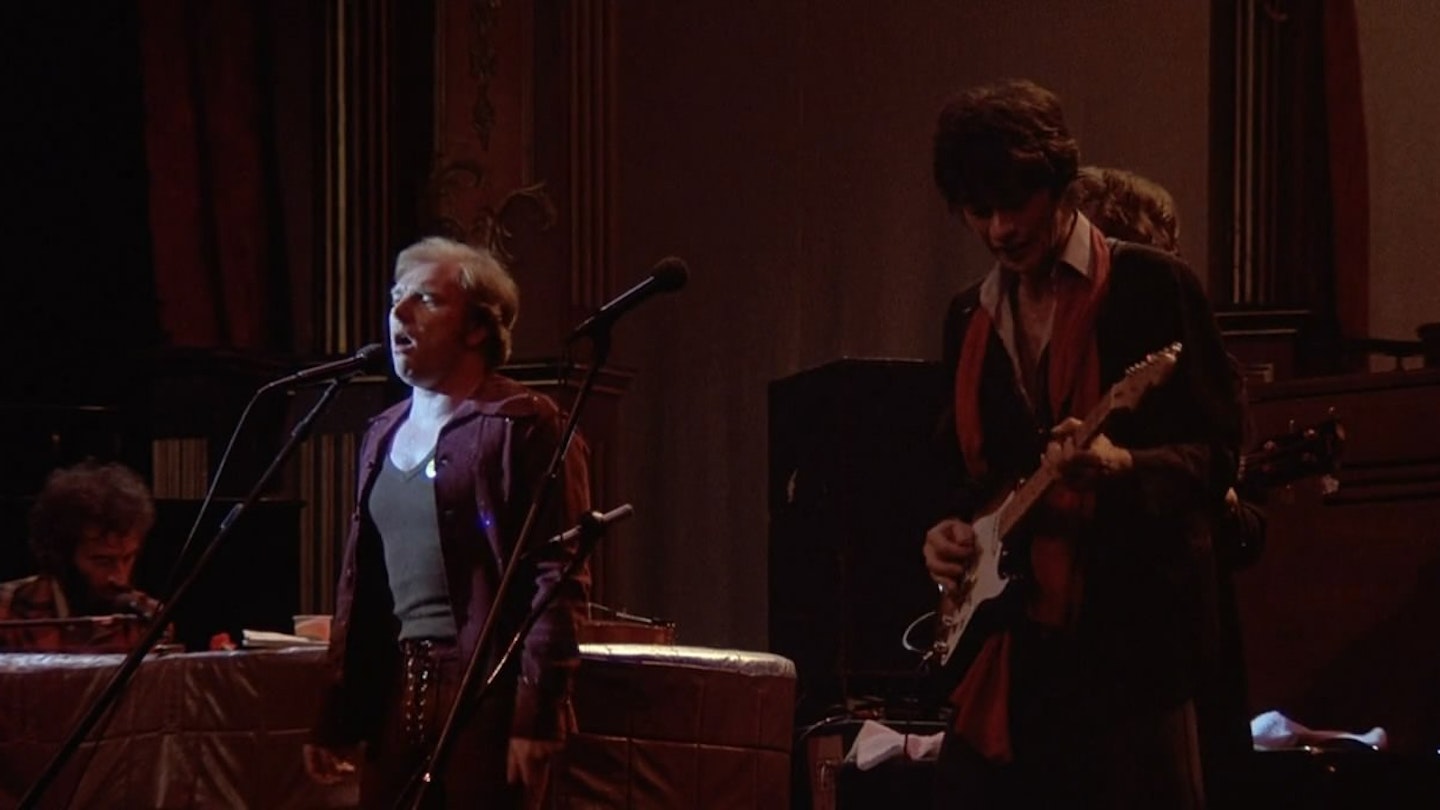
The Last Waltz: A Timeless Movie Review of Scorsese’s Rock Documentary
Martin Scorsese’s The Last Waltz, a documentary chronicling The Band’s farewell concert on Thanksgiving Day 1976, remains a seminal work in the concert film genre. More than just a recording of a performance, it’s an intimate portrait of a group at the end of an era, grappling with burnout, creative differences, and the bittersweet reality of saying goodbye. This movie review delves into the enduring appeal of The Last Waltz, exploring its historical context, artistic merit, and the lasting impact it has had on music and film.
A Farewell to The Band
The Last Waltz wasn’t just a concert; it was a carefully orchestrated event held at the Winterland Ballroom in San Francisco. The Band, comprised of Rick Danko, Levon Helm, Garth Hudson, Richard Manuel, and Robbie Robertson, had been a cornerstone of the rock scene for over a decade, backing Bob Dylan during his electric period and releasing a string of influential albums. However, by 1976, the road had taken its toll. Robbie Robertson, in particular, felt the need to move on, leading to the decision to make this concert their final performance as a touring group.
The concert itself was a star-studded affair, featuring a who’s who of musical legends including Bob Dylan, Eric Clapton, Neil Young, Joni Mitchell, Van Morrison, and Muddy Waters. Scorsese, already a rising force in Hollywood, was brought on to direct the film, bringing his signature cinematic style to the rock documentary genre.
Scorsese’s Vision: More Than Just a Concert Film
What sets The Last Waltz apart from other concert films is Scorsese’s artistic vision. He doesn’t simply point cameras at the stage; he crafts a narrative that explores the dynamics within The Band, their history, and their relationship to the music they created. Interspersed with the concert footage are interview segments with the band members, providing insights into their personalities and perspectives. These interviews, filmed in a darkened studio, add a layer of intimacy and reflection to the film.
Scorsese also uses cinematic techniques to enhance the viewing experience. He employs dramatic lighting, dynamic camera angles, and slow-motion shots to capture the energy and emotion of the performance. The film is meticulously edited, seamlessly blending the concert footage with the interview segments and historical footage. This creates a cohesive and engaging narrative that transcends the typical concert film format. The use of theatrical sets for the interview segments, and the overall high production value, elevated the concert film to a new level of artistic expression.
Musical Highlights and Memorable Performances
The Last Waltz is packed with unforgettable musical moments. From The Band’s own classics like “The Weight” and “Up on Cripple Creek” to the electrifying performances by their guest artists, the film is a celebration of rock, blues, and folk music. Neil Young’s rendition of “Helpless,” with its haunting harmonies, is a standout performance. Van Morrison’s energetic take on “Caravan” is another highlight, showcasing his raw vocal power and stage presence. Muddy Waters’ performance of “Mannish Boy” is a powerful tribute to the blues, while Bob Dylan’s appearance is a fitting culmination to The Band’s long association with the iconic singer-songwriter.
The film also captures the camaraderie and mutual respect between The Band and their guests. There’s a palpable sense of joy and celebration in the air, as these legendary musicians come together to pay tribute to The Band’s legacy. The performances are not just technically proficient; they are filled with genuine emotion and passion.
Criticisms and Controversies
Despite its critical acclaim, The Last Waltz has also faced its share of criticisms. Levon Helm, The Band’s drummer and vocalist, was particularly vocal about his dissatisfaction with the film. He felt that Robbie Robertson was given undue prominence and that the film misrepresented the dynamics within the group. Helm also criticized Scorsese for focusing too much on Robertson’s perspective, while neglecting the contributions of the other band members.
Some critics have also argued that the film romanticizes the idea of rock and roll excess. The film doesn’t shy away from depicting the band’s struggles with drugs and alcohol, but it doesn’t necessarily condemn them either. This has led some to question whether the film glorifies a lifestyle that can be harmful and destructive. Despite these criticisms, The Last Waltz remains a powerful and influential film, sparking debate and discussion about the nature of rock and roll, artistic collaboration, and the challenges of fame.
The Lasting Impact of The Last Waltz
The Last Waltz has had a profound impact on both music and film. It helped to elevate the concert film to an art form, demonstrating that it could be more than just a simple recording of a performance. Scorsese’s innovative filmmaking techniques set a new standard for the genre, influencing countless directors who followed in his footsteps. The film also helped to solidify The Band’s legacy as one of the most important and influential groups in rock history.
Beyond its artistic merits, The Last Waltz also serves as a valuable historical document. It captures a specific moment in time, preserving the music and culture of the 1970s for future generations. The film offers a glimpse into the lives and minds of these legendary musicians, providing insights into their creative process and their struggles with fame and success.
Even today, The Last Waltz continues to be celebrated and studied by music fans and film enthusiasts alike. Its enduring appeal lies in its combination of great music, masterful filmmaking, and its exploration of universal themes such as friendship, loss, and the passage of time. It’s a film that can be enjoyed on multiple levels, offering something for everyone who appreciates great music and compelling storytelling.
The Last Waltz: A Movie Review Conclusion
In conclusion, The Last Waltz is more than just a concert film; it’s a cinematic masterpiece that captures the essence of The Band and their era. Scorsese’s masterful direction, combined with the incredible musical performances, makes for an unforgettable viewing experience. Despite the controversies and criticisms, The Last Waltz remains a timeless classic that continues to inspire and influence artists and audiences alike. This movie review affirms its place as a cornerstone of rock history and a testament to the power of music and film to capture the human experience. The legacy of The Last Waltz is secure as one of the greatest concert films ever made. Its impact on music and film is undeniable, and its enduring appeal ensures that it will continue to be celebrated for generations to come. From the meticulously crafted sets to the raw emotion of the performances, The Last Waltz is a testament to the power of collaboration and the enduring magic of rock and roll. Whether you’re a longtime fan of The Band or simply appreciate great music and filmmaking, The Last Waltz is a must-see film. It’s a celebration of a legendary group, a tribute to a bygone era, and a reminder of the power of music to unite and inspire.
[See also: The Best Music Documentaries of All Time]
[See also: Martin Scorsese’s Filmography: A Retrospective]
[See also: The History of The Band]

